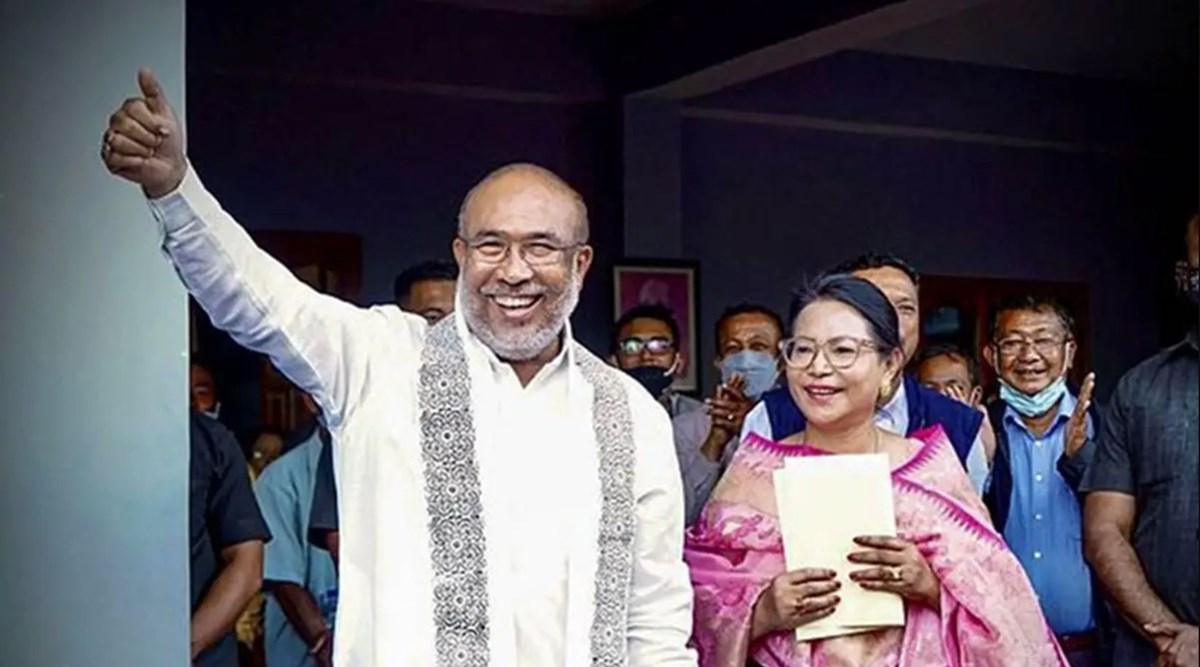 Chief Minister N. Biren Singh gestures after party's victory in Assembly polls, outside of his residence, in Imphal, Thursday, March 10, 2022. (PTI)
Chief Minister N. Biren Singh gestures after party's victory in Assembly polls, outside of his residence, in Imphal, Thursday, March 10, 2022. (PTI) The results of the 12th Manipur Assembly election mark the consolidation of the BJP in the state and diminish the electoral significance of the Congress. The latter failed to touch double digits and has seen a reduction in its vote share by more than half — from 35 per cent to 16 per cent. Its seat share has fallen even more drastically — the party that had won 28 seats in 2017, won just five seats this time. The fact that Gaikhangam Gangmei, the state’s Congress chief, was convincingly trounced by a BJP candidate and the once-invincible Ibobi Singh could manage a victory margin of around 2,500 votes, underscores the party’s electoral fragility in the state. Gripped by rampant defection, lack of funds, and with no popular and new-generation leaders in sight, the Congress’s electoral decimation is almost complete.
While the Congress barely managed second and a distant third place in 14 seats each, the BJP secured second and third place in 21 and 4 seats, respectively. Previous bit players like the NPP (National People’s Party) and JD-U (Janata Dal-United) outperformed the Congress by securing seven and six seats — the NPP managed second place in an equal number of seats as the Congress.
Despite the BJP’s impressive performance in securing a majority on its own for the first time, what remains constant in Manipur’s electoral politics is the fluid multi-nodal and multi-party system, which is amenable to the formation of coalitions comprising parties with seemingly incongruous leanings and changes in coalitions according to the changes in electoral configurations at the national level. The latter is a function of the small-state party syndrome: Small states like Manipur are heavily dependent on central funds and that results in party configurations changing with changes at the national level. While this logic may open a window of opportunity for the Congress to bounce back in the future, for now, it has facilitated and explains the dramatic increase in the electoral appeal of the BJP across communities in Manipur, despite serious reservations about the party’s Hindutva agenda.
It would, therefore, be naïve to see the increase and consolidation of BJP’s seat and vote share as a wholehearted endorsement of what the party stands for. This is also because many of the winning BJP candidates are drawn from “defectors”. The failure of incumbent MLAs like Chaltonlien Amo, a Congress “defector”, and V Hangkhanlian to return to power on a BJP ticket in the two Christian-dominated constituencies of Tipaimukh and Lamka (in Churachandpur district) can be ascribed to the substantial reservations about the BJP’s Hindutva agenda.
However, this is not to discount the import of changing social and power dynamics in places that witnessed tight contests. Here, the BJP’s electoral appeal was mediated by a complex combination of cross-cutting cleavages along clans, church denominations, and tribes on the one hand and the stake of armed groups in electoral outcomes on the other. That the BJP’s resourceful electoral machine continues to remain fragile becomes apparent because the party was trounced in assembly segments in Senapati and Ukhrul districts that continue to be dominated by the NPF (Naga People’s Front), a party that advocated the territorial integration of Naga-inhabited areas.
This election also underlined the continuing hold of money power and ethnic armed groups in determining electoral outcomes. Reports of vote-buying and booth capturing by various armed groups bear this out. The failure of Langkhanpau Guite and Lamtinthang Haokip to win Thanlon and Saitu constituencies, despite their charismatic appeal, underlines how the lack of money power and the presence of armed groups can prove to be stumbling blocks.
Riding on popular appeal, the BJP decided to go solo in the 60 assembly constituencies, compelling its two key partners in the North East Democratic Alliance (NEDA), the NPF and NPP, to electorally compete with it. With the BJP securing a majority on its own, the two parties may have become dispensable for it. This means that unlike the 11th Assembly where the BJP was susceptible to “coalitional blackmail”— to draw from Italian political scientist, Giovanni Sartori — and eight of the 12 berths had to be given to coalition partners (NPF, NPP and a Congress-defector), the role of these parties in forming and running the government is likely to be inconsequential.
Given that the BJP draws many of its elected members from “defectors” from other parties — including Konthoujam Govindas Singh, a former Congress leader — whose loyalties cannot be taken for granted, it would be interesting to see how the internal dynamics of its leaders and multiple power centres within the BJP unravel in the days to come. For now, Biren Singh seems to be comfortably placed — he won his seat by an impressive margin of over 12,000 votes. Singh’s wife, SS Olish, won the Chandel seat by securing almost 80 per cent votes. The successful return of Thongam Biswajit Singh and Konthoujam Govindas Singh on BJP tickets means that the two could be important centres in the party.
A leadership struggle within the BJP remains a possibility, especially given that Biswajit Singh had already posed a challenge to Biren Singh in the last assembly. The possibility of competition on the leadership issue within the BJP — even outside it — means the party remains fluid in the state even as it seems to be consolidating its position. That is an interesting aspect to look out for in the coming days.
(The writer is professor and head of department of political science, University of Hyderabad)
- The Indian Express website has been rated GREEN for its credibility and trustworthiness by Newsguard, a global service that rates news sources for their journalistic standards.

